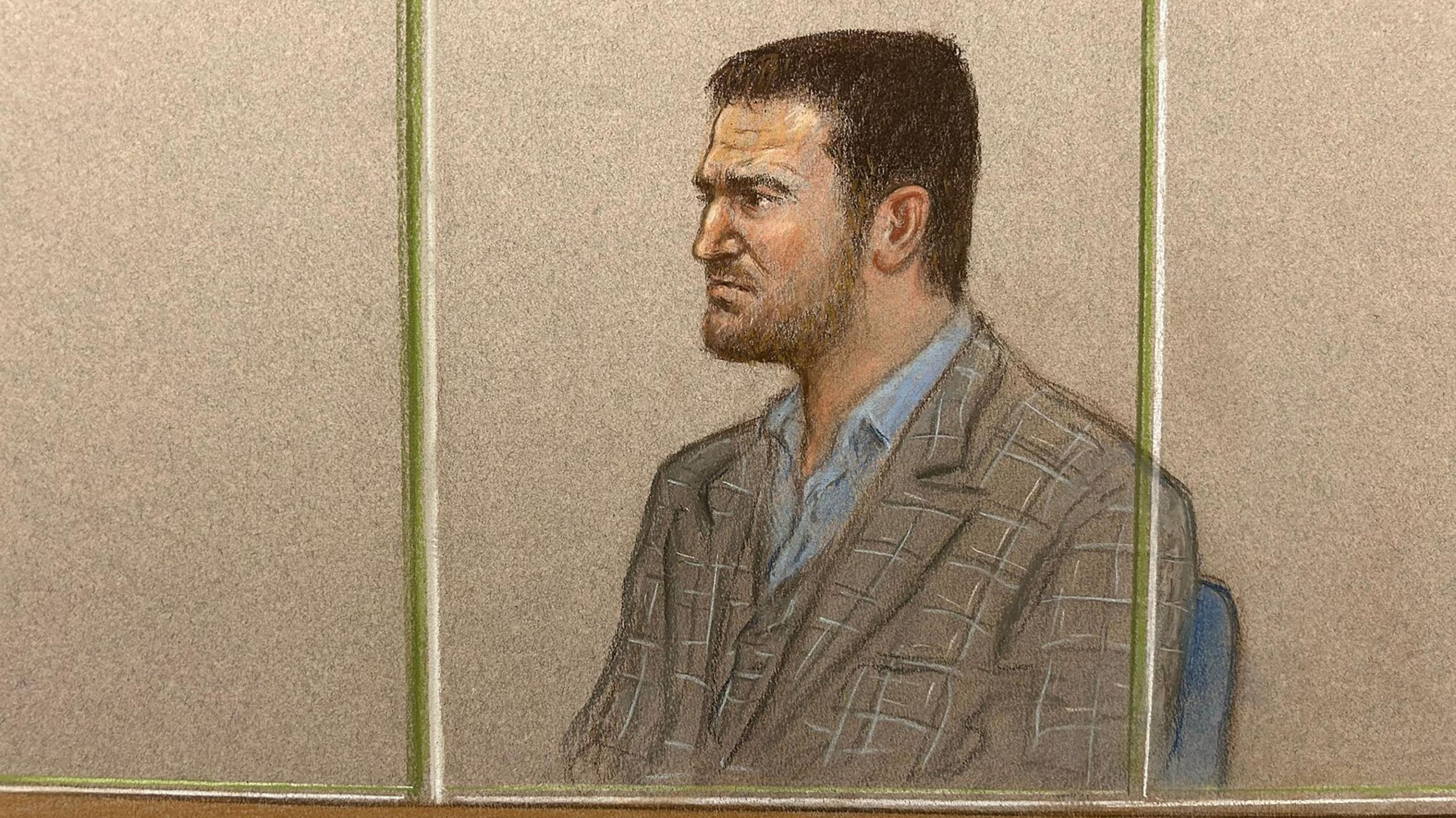Tommy Robinson jailed for contempt of court

- Published
Far-right activist Tommy Robinson has been jailed for 18 months after admitting contempt of court by repeating false claims against a Syrian refugee.
Robinson, whose real name is Stephen Yaxley-Lennon, admitted 10 breaches of a High Court order made in 2021, during a hearing at Woolwich Crown Court.
Lawyers for the solicitor general accused the 41-year-old of "undermining" the rule of law.
Passing sentence, Judge Mr Justice Johnson said the breaches of the injunction, which prevented Yaxley-Lennon from repeating the allegations, were not “accidental, negligent or merely reckless” and the custodial threshold was "amply crossed”.
The hearing on Monday was the culmination of events that date back to October 2018.
That month, a video went viral showing how Jamal Hijazi, a Syrian in West Yorkshire, had been attacked by another teenager at school.
Yaxley-Lennon then posted his own response to one million Facebook followers alleging that his investigation had established that Mr Hijazi was a violent thug, a claim that was untrue.
The Yaxley-Lennon video spread widely and the Syrian teenager and his family received death threats.
Three years later, Mr Hijazi won £100,000 in damages when the High Court ruled Yaxley-Lennon’s claims against him had amounted to defamation.
The court imposed an injunction on Yaxley-Lennon, banning him from making the false claims again.
In February 2023, Yaxley-Lennon, who founded the long-defunct English Defence League (EDL), began repeating the claims and went on to post online a film claiming he had been “silenced” by the state.
That film may have been viewed at least 47 million times.
Eventually, this July, the anti-Islam activist showed the film to thousands of his supporters in London's Trafalgar Square, saying he would not be silenced. The following day he left the country.
Aidan Eardley KC, for Solicitor General Sarah Sackman, told the court that Yaxley-Lennon had intended to repeat the false allegations, despite the injunction, and then take “evasive” measures.

Robinson has been jailed after admitting 10 breaches of a High Court order made in 2021
“This is a high culpability case because of the high number of breaches,” said Mr Eardley.
“It is a continuing breach, the material is still out there and some of it is under the defendant's control.”
Sasha Wass KC, for Yaxley-Lennon, said he was a journalist who had been following his principles and was a passionate believer in free speech.
“This defendant has been neither sly nor dishonest nor seeking gain for himself,” she said.
She said that he was such a controversial figure he may be placed in solitary confinement by prison governors, as had occurred the last time he had been jailed, and there was medical evidence he had previously suffered trauma, panic attacks and nightmares.
Jailing Yaxley-Lennon for 18 months, Mr Justice Johnson said: “In a democratic society underpinned by the rule of law, court orders must be obeyed.
“Nobody is above the law. Nobody can pick or choose which laws or which injunctions they obey, or which they do not.
“Even if they believe that an injunction is... contrary to their views they must comply with the injunction.
“They are not entitled to set themselves up as the judge in their own court. Otherwise the administration of justice and rule of law would break down.”
Tommy Robinson remanded in custody ahead of court date
- Published25 October 2024
Tommy Robinson facing new contempt of court allegations
- Published28 August 2024
Tommy Robinson loses Syrian schoolboy libel case
- Published22 July 2021
The judge said that the contempt of court had been aggravated because the defendant had repeated the claims after the beginning of proceedings against him - and he had not taken steps to stop the false claims continuing to be in circulation.
The sentence could in future be cut by four months if the defendant showed the court that he had taken steps to remove the offending film.
But the judge added: “The defendant has not shown any inclination to comply with the injunction in the future. All of his actions suggest that he regards himself as above the law.”
This case was the fourth contempt case he has faced, having previously received a suspended sentence and a six-month jail term.
Yaxley-Lennon has been separately charged with failing to unlock his phone for police when he was stopped and questioned at a port under counter-terrorism powers. He will next appear in court in relation to that allegation in November.